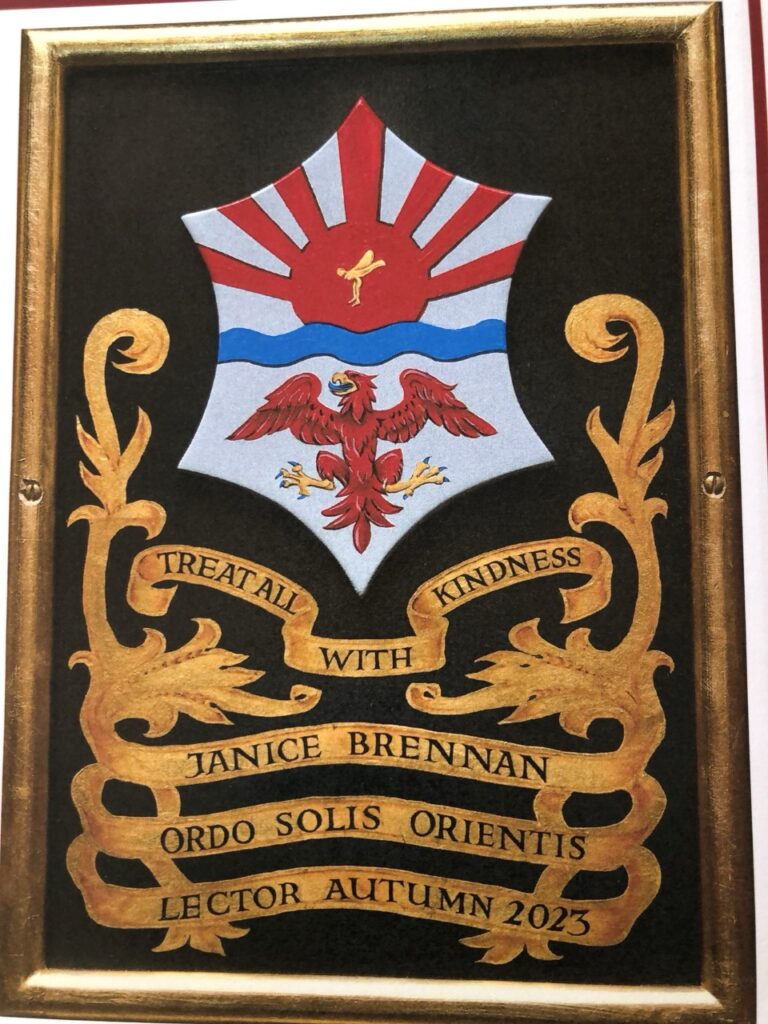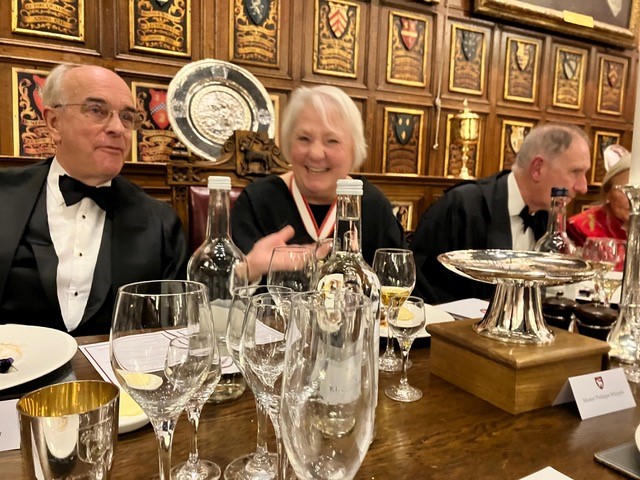Reader’s Feast | Wednesday 14 November 2023 | Lifetime of Laughter in the Courtroom – Lessons I have Learned
Some people say that the whole legal system is a joke. I am not such a cynic. While no one could possibly assert that our system is perfect, without doubt we have a system of which we can and should be immensely proud. It is the envy of the world, most especially in those countries where people struggle for democracy and an independent judiciary.
I take my work as an advocate at the Criminal Bar very seriously indeed. I always have done, and I hope I always will. To the victims of crime and their friends and families, and to defendants and their friends and families, an appearance at court can be a life defining moment. But that does not mean that there is no place for humour and dare I say it, occasional moments of sheer fun.
I learned one very important lesson about etiquette in the courtroom before I was even Called to the Bar. Do not fall asleep in court. Especially when you are the judge. I was just 21 years old, straight out of university, when I was lucky enough for three glorious weeks to be the Marshal to a High Court Judge who was then sitting in Leeds and Sheffield. One day she had to hear an exceptionally dull civil case conducted by two exceptionally dull advocates, who spent most of their time with their heads buried in their totally disorganised papers. Those members of the Bar would certainly have benefitted from some compulsory advocacy training.

Even though I was at the stage of my legal career where everything in court was exciting and new, I was bored rigid. But at least I managed to stay awake, which is more than the judge did. She was without doubt asleep. Her head rested on her hand, and I could hear gentle snores. Young and inexperienced though I was, I realised that if the participants in the case spotted that she was asleep, there would be trouble, to put it mildly. It was clearly up to me to wake her, but discreetly.
So, I rustled the pages in my notebook, in the hope that the sound would rouse her. Failure. The gentle snores continued. I fidgeted in my seat, scraping the chair across the floor. Failure. In desperation I kicked the wooden bench. Success. The snores stopped, the judge removed her head from her hand, picked up her pen and carried on as if nothing had happened. I sat in my seat no doubt looking rather smug as I silently congratulated myself for handling a tricky situation so very discreetly. At the end of the afternoon, we drove back to the Judges’ Lodgings with the other two High Court Judges. My judge took me aside to one of the drawing rooms. This is it, I thought, she is going to thank me for saving her from public disgrace. Not a bit of it. ‘Janice’, she said, ’you must learn to be quieter in court’. It is probably the only time in my entire life that I have been rendered speechless.
To this day I have never found the courage to tell her the truth. Fortunately, the episode did no harm whatsoever to her judicial career. She went on to become President of the Family Division and an exceptionally well-regarded judge, and deservedly so.
And no, I have never fallen asleep myself in court and I hope that, as an advocate, I have never caused anyone else to either. But it does remind me of a story I heard from a dear friend on the Northern Circuit, Master John Rowe, a former Chair of the Bar and an absolutely brilliant raconteur.
The defendant was charged with sexual assault. The complainant was asked by the prosecutor to tell the jury what happened. She was a well brought up young lady who could not bring herself to use bad language in public. So, she asked if she could write down what the defendant had said to her rather than say it out loud. The judge granted her permission to do so. The usher handed her a piece of paper on which she wrote the following words (and I apologise for the language): ‘Let’s fuck.’
The usher took the piece of paper and handed it to the judge, who looked at it gravely, gave it back to the usher who took it to the two advocates and finally to the jury box. Juror number one took the piece of paper, read it and passed the note to juror number two, who read it and passed it to juror number three. And so, it went on, each juror reading the note before passing it to the next juror. But one of the jurors was asleep. Let’s call him, and it was a male, juror number 12. Juror number 11 was a rather attractive young lady. She read the note, nudged juror number 12 next to her, which woke him up, and passed him the note. He read it, looked at the lovely young lady next to him, smiled, winked at her and put the note in his pocket.
To his horror the judge then said to him: ‘Please hand the note to the Usher.’ ‘Oh no’, said the juror, ‘it’s a private message for me.’
So, lesson number one from me, don’t fall asleep in the courtroom. Lesson number two is don’t overlook the value of using a visual aid in the courtroom.
When I was a baby barrister, as well as criminal cases which have always been my first love, I also did whatever other work my clerks gave me and this proved to be a very good foundation for my life as an advocate, as well as fairly lucrative financially.
One such case was a breach of contract case in the County Court. A small ballet company had commissioned a dressmaker to make the costumes for the character of Odette/Odile in Swan Lake, my all-time favourite ballet. The dressmaker had never made costumes for a ballet before. She was more accustomed to making very elegant and floaty evening dresses. She had not appreciated that for ballet dancers the fit had to be absolutely perfect. Sadly hers, whilst beautiful, were not a perfect fit and so the ballet company had declined to pay for them. She sued. The solicitor for the ballet company knew how passionate I was about classical ballet and so he asked me to represent them.
As part of the evidence, I had a large bundle of photographs showing the various costumes. But I decided that I could do better than that and I arranged for two of the ballet dancers to attend court, a male and, of course, a female wearing the Odette/Odile costumes. In front of the judge, I got these dancers to perform some of the moves from one of the pas de deux. Every time that the ballerina lifted an arm, out would pop one of her breasts, so badly did her costume fit. Every time her partner attempted to lift her; she almost flew out of her dress. Seeing this, the judge needed no more persuasion. He rose and invited my opponent to discuss settlement terms with me.
I doubt that the judge has ever forgotten that case; I never will. Would we have got the same result just with photographs, who knows? Having the dancers at court certainly brought the case alive and, I believe, was far more effective than mere photographs. It was also a great deal of fun. Never before had so many court staff suddenly found a need to visit this particular courtroom.
Lesson number three is do your homework before the trial starts. I was once berated by a man I was prosecuting during the course of my cross-examination of him. The charge against him was murder. He had killed his girlfriend, who was the landlady of a pub in Hampshire. Unfortunately for him, his attack on her was captured in full on the pub’s CCTV cameras. He tried to argue that she had provoked him, which, if true, would have made him guilty only of manslaughter, not murder. Of course, the CCTV footage had no audio and so it was necessary for me to call evidence from witnesses who had been in the pub earlier that evening. For reasons I cannot now recall, some of the witnesses gave evidence about a pub game that the defendant had taken part in called ‘Oops upside your head’. It was a game I had never heard of before and frankly I didn’t see the need to know exactly what it involved.
For those of you who share my ignorance it is a game often played by those who have drunk far too much, where you all sit on the floor with another person between your legs and so on and you all sway one way and then another, or something like that.
Eventually the defendant went into the witness box, and I got to cross-examine him. He did not like being cross-examined by me. Suddenly, apropos nothing whatsoever, he began to wag his finger at me. ‘Mrs Prosecutor’, he said, (he’d forgotten my name). ‘Mrs Prosecutor, you have not done your homework’ and on and on he ranted about this game. For about 25 minutes not even the judge could get a word in edgeways before the defendant stormed out of the witness box and refused to be cross-examined further.
I am pleased to say that the defendant is now serving a life sentence for murder. I still don’t really know what this game is. But at the end of the trial, I was deeply touched when the police gave me a small present. It was a CD with the music for ’Oops upside your head.’ A reminder that I had not done my homework.
I trust that you are all still paying attention to this very serious lecture and have not forgotten lesson number one, which was don’t fall asleep.
I turn now to lesson number four – choose your words with care, or put another way, engage brain before you operate mouth. Advocates are skilled wordsmiths. We are the spokesmen and women for those unable to articulate their own cases. We are renowned for our ability to choose exactly the right word or phrase at the right time, aren’t we? Let me give you two examples where I did not.
I was prosecuting a man for a very serious assault where he had used his dogs to attack a neighbour he disliked. That neighbour had ended up with a truly dreadful bite wound on her arm. Unfortunately, trying to get evidence from her proved to be a nightmare. She spoke at twice the speed of sound, and I could not get her to slow down. Again and again, I would interrupt and ask her to pause so that the judge could take a proper note of her evidence. To no avail. On and on she spoke without seemingly even pausing for breath. I would ask short, focused questions requiring merely a short focused answer. Hopeless. On and on she went.
Eventually I interrupted yet again and said without thinking: ‘Let’s just take your evidence in bite sized chunks.’ The jury fell about in fits of laughter. Even the poor judge struggled to keep a straight face. Fortunately, the witness was so wrapped up in her nonstop flow that she hadn’t noticed what I said. Do please choose your words with care and engage your brain before you operate your mouth.
It is not just the advocates who need to remember this lesson. Judges should too. So let me give you my second example of this lesson. The charge was rape. The complainant was in the witness box giving her tearful account of what happened. The judge had had a long morning. It was 12:59pm. He was ready for his lunch at 1:00pm. The complainant had just told the jury how the defendant had forced her legs apart and violently thrust his penis inside her vagina. Noticing that the time was now 1:00pm, the judge, without thinking, turned to the jury and said: ‘We’ll leave it there until 2:15pm.’ Judges too must choose their words with care.
Lesson number five is don’t make grandiose gestures in court without first checking who is present. I was asked to prosecute some defendants for living on the earnings of prostitution. For much of the last day a number of very attractive, but scantily dressed young prostitutes, who were friends of the defendants, had been sitting in the front row of the public gallery listening attentively to the case. As you may or may not know, another term for prostitutes is ‘working girls.’
The time came for my final speech to the jury. Trying to be clever, I made a grandiose gesture with my arm to the public gallery as I spoke about ‘these working girls’. I should have noticed the quizzical looks on the faces of some of the jurors. But no, I carried on unperturbed with my speech. Only after the court had risen for that day did I learn that during the afternoon the group of young, attractive prostitutes had quietly left the courtroom and in their places in the front row of the public gallery were a number of absolutely delightful, thoroughly charming, but rather elderly ladies from the witness service, dressed as they often were in twinsets and pearls, who had come into the courtroom to listen to my final speech. They were, they told me later, thrilled at being described by me as ‘working girls.’
Lesson number six – check that you are properly dressed before you go into the courtroom.
Judge Hetherington was one of the most courteous judges I have ever appeared before. For many years he was the Resident Judge at Portsmouth Crown Court. He was a perfect gentleman. One day I was due first on at 10:00am in his court. As always, I arrived early, got robed and sat in Counsel’s row ready to start. Just as the judge was brought into the courtroom by the usher, I realised to my horror that, although I had on my wig and gown, I had completely forgotten to put on my white bands.
Before the Judge had even managed to sit down properly, I apologised in fulsome terms for not being properly dressed. Being the absolute gentleman that he always was, Judge Hetherington immediately averted his eyes, no doubt thinking that I must be semi-naked. Since then, I have never failed to check my clothing before stepping foot in court and I advise you to do the same.
My next lesson for you, number seven – avoid anything in Latin. Advocates are communicators. Everyone in the courtroom needs to hear and understand what is said. You are not there for a private chat with the judge. Your client, his mum, his girlfriend, other members of the public, they all need to know and understand what is going on. Abbreviations are not appropriate. It is assault occasioning actual bodily harm, not ABH. It is a Plea and Trial Preparation Hearing, not a PTPH. As for Latin, no, no and no again.
I remember asking a friend of mine, who was the Serbian Ambassador to the Vatican, what language he used when he had an Audience with the Pope, who was Polish. I tried to think what language they had in common. To my amazement he said Latin. Had I had such an audience the conversation would have been exceptionally brief. Amo, amas, amat, amamus, amatis, amant is probably the limit of what I could have said in Latin. The Pope would have seen me as a complete idiot who loved the world.
Master John Rowe used to tell the wonderful story of a case he did in some small County Court on the Northern Circuit. His client was an ordinary working class Liverpudlian who lived in Fazakerley. The rather pompous judge, trying to show off his superior intellect, at one point said to John Rowe, ‘Your client is of course familiar with the principle, ex turpi causa non oritur actio*?’ To which Master Rowe in his fabulous Northern accent (which I won’t even attempt to replicate) replied: ’Your Honour, in the terraced houses of Fazarkerly, in the northern suburbs of Liverpool, where my client resides, they speak of little else.’ *a claimant cannot pursue a cause of action that arises in connection with his own illegal act.
Lesson number eight – don’t expect praise. It is a well-known fact of life at the Bar that you will be thanked profusely for the few cases where you have barely had to get your brain out of first gear, far less break into a sweat, but get nothing other than silence or worse, abuse, in those cases where you have worked your hardest and even achieved a spectacular result. I will never forget a trial I did in Portsmouth where the jury took three minutes to reach its verdict. It took one minute for them to walk into their retiring room, one minute to decide my client was guilty and one minute to walk back into the courtroom to deliver that verdict.
My client was a senior Naval officer, who had gone into some public lavatories in a park in Southampton. Unfortunately for him and wholly unconnected with him, the local constabulary was carrying out a surveillance operation at those public lavatories and had installed some CCTV cameras there. The prosecution case centred on that CCTV footage, which, as always is the case when you are defending, was crystal clear.
Before the trial started, I had discussed this evidence many times with my client. Yes, he admitted, that is my hand. No, that is not my own penis in my hand. This was in the days when homosexual acts in a public place even between consenting adults was a crime. This senior Naval officer simply could not bring himself to plead guilty despite the overwhelming, unequivocal evidence. I had absolutely nothing to work with at the trial other than to whinge to the jury about concealed cameras, speak about my client’s distinguished Naval career and remind them of the burden and standard of proof.
The inevitable verdict of guilty was followed by an impassioned plea in mitigation from me, which I am pleased to say resulted in nothing more by way of punishment than an absolute discharge, the lowest possible punishment.
The defendant’s wife had not been present at any of the pre-trial conferences. Nor had she been in the courtroom during the trial. She waited just outside. So she simply did not know what the evidence against her husband was. When her husband and I approached her after the case and he explained to her that he had been found guilty, but received an absolute discharge, she turned on me and declared it to be a complete miscarriage of justice, how could I have let that happen, I clearly hadn’t done a good enough job, I was incompetent etc. She will no doubt go to her grave believing that it was all my fault.
My ninth lesson – if you have an appeal case, listen to the cases listed before yours. Are there any Court of Appeal Judges here tonight? If so, you can vouch for the wisdom of this next piece of advice that I received from none other than the then Vice President, Lord Justice Rose, Master Christopher Rose.
I was moaning to him one evening about how unpredictable the Court of Appeal, Criminal Division, was. They seem to allow appeals that I think are without merit and reject those that I think are strong.
‘No, no, Janice’ he said, ‘you are simply approaching us the wrong way. What you should do is ask: Have your Lordships allowed any appeals so far this week? If the answer to your question is no, carry on with your appeal, you are in with a chance. But if the answer to your question is yes, we have, shut up, bow politely and sit down.’
And you know there is a grain of truth in what Master Rose said. The Court of Appeal may have a list of, say, 10 cases including yours. If yours is towards the bottom of the list, listen to the ones before you. I will guarantee that if the Court of Appeal has dismissed the first seven or eight appeals, they are bound to allow the appeal in one of the remaining cases rather than let it appear that they reject every submission.
I have often thought that on the day before I retire, I might like to put Master Rose’s advice to the test, although some wag quipped that the day that I do try it will be the day that I retire.
Lesson number 10 – know when to shut up. A very nice young member of the Bar was defending a case that I prosecuted. He cross-examined the Officer in the case as follows;
’Officer, would you agree that my client was calm and compliant when you arrested him?’ Yes he was.
’Officer, would you agree that he answered every question that you asked him in his interview?’ Yes, he did.
‘Officer, would you agree that he was polite and respectful throughout?’ Yes, he was.
Why oh why did the advocate not stop there?
But no, he thought he could do even better. He was on a roll. ‘Officer, my client could not have been more co-operative, could he?’
There was silence for a moment, then the Police Officer replied: ‘Well he could have confessed.’
Beware the one question too many.
What is my final lesson? It is to have fun. We are incredibly privileged to have one of the best, one of the most enjoyable careers that a person could ever hope to have. I set my heart on being a barrister when I was about 12 years old. I had grown up watching a television programme called Crown Court and I had sat in the public gallery at a Crown Court during one of my school holidays. That was what I wanted to do. There were no lawyers in my family. I had never even met one. I was just an ordinary person from a working class/barely middle-class family, the first in my family to go to university. I was Called to the Bar here in this magnificent Hall aged just 22.
My first dinner was terrifying. I knew nobody. I was convinced that I was completely out of my depth. But it turned out that I was not alone. The Middle Temple welcomed me, nurtured me, helped and encouraged me. Friends that I made in those early years became friends for life. There was always someone to whom I could turn for advice and guidance.
One piece of advice that I was given was to always look for something in every case that makes you smile. It may be a piece of evidence, a word mis-typed or mis-spelt that causes a laugh, it may be a witness’s name, anything. When you are dealing with a dreadful case perhaps involving a great deal of trauma, that light-hearted something can just ease the tension a little. Humour, even black humour is a wonderful coping mechanism. Put together any group of the medical profession, or police officers, or the military or anyone with a high-pressured job and you will hear them ease the pressure on themselves with occasional laughter. Humour used at the right time and in the right company is a good thing.
If those of you just starting in your legal careers enjoy yourselves even half as much as I have since I began my career now 43 years ago, then you will be very fortunate. So, remember, work hard, but have fun too.
Master Treasurer, thank you so much for allowing me the honour of serving as your Autumn Reader. I will never forget your kindness. I cannot end without saying how immensely grateful I am to the Middle Temple, its members and its staff. Little did I suspect when I joined as a student in 1977 during my second year at university that one day I would be elected a Bencher of this Inn. Never in my wildest dreams did I think that I, a complete nobody, would ever be given the enormous honour of being appointed Reader. To you all I say simply ‘thank you from the bottom of my heart.’

Master Janice Brennan read law at King’s College, London. She was Called to the Bar, aged just 22, where she joined the Western Circuit, specialising in crime. In October 2023 she received the Order of the Rising Sun. Appointed a Bencher in 2001, she was Autumn Reader for 2023.





